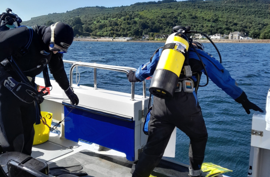Are your sites ready for winter? 4 steps to stay compliant and operational
Published: 17 October 2023
As winter rapidly approaches, organisations across various sectors will face challenges posed by changing weather conditions. By understanding these challenges and the environmental risks posed to your sites, you can make sure your assets remain compliant and operational.

These four steps will help you identify and mitigate these risks, ensuring your readiness for whatever winter has in store.
Step 1: Safeguard tanks and pipework
In the colder months, sites storing fuel will encounter increased demand and heightened risks as tanks and pipework are more vulnerable to being damaged by the freezing temperatures.
A common issue during temperature drops is the potential for burst pipework. Proactive measures must be taken to protect these components against corrosion and physical damage.
For sites where heating systems have been inactive during the summer, it is imperative to conduct thorough inspections before reactivating them. This pre-winter check ensures the integrity of tanks and pipes, minimising the risk of oil spills and operational disruption.
Step 2: Assess the integrity of bunding
Verifying the integrity of bunds is paramount as we head into winter. Fluctuations in temperature when transitioning from hot to cold can lead to cracks in bund lining. Such cracks pose a significant risk of hazardous materials being released into the environment, causing potential downtime and environmental penalties.
Additionally, inspecting pump or valve drains is advisable due to the elevated risk of winter flooding.
A specialist can check all the bunds across your sites and offer remediation work to make them safe and compliant before the winter comes.
Step 3: Check your separators
Separators are pivotal in preventing pollution. Neglecting to maintain them can lead to blockages and filter saturation, which may result in flooding or contamination of local water sources. Non-compliance with separator maintenance standards could also lead to substantial fines - or even prosecution.
Just before winter is a good time to check your separators because dust accumulates following prolonged dry spells in the summer and turns into silt when it rains, potentially causing blockages.
Separator standards
The current industry standard for separator operation and maintenance is BS EN 858-2:2003 Separator systems for light liquids (e.g. oil and petrol). According to BS EN 858-2:2003, separators should:
- Be fitted with an automatic warning device/high-level alarm
- Be serviced and maintained on a six-monthly basis as a minimum
- Be subject to a maximum interval of a five-yearly integrity test
- Have full service and maintenance records available for inspection
Step 4: Keep drainage flowing freely
Autumn is a good time to carry out a comprehensive assessment of your drainage network, as falling leaves often contribute to blockages. If gully pots are blocked with leaves and debris, your drainage network can be overwhelmed by higher levels of water during winter.
Talk to a specialist who can check the drainage on your sites. Having an emergency flood response contract in place can expedite recovery in the event of a flood, which reduces operational downtime and getting things back to normal safely and swiftly.
“We can help organisations establish a planned preventive maintenance (PPM) regime. This will not only keep your sites compliant and operational this winter, but also extend the lifespan of your assets...”
Shirley Miles, Head of Environmental Protection
Take proactive measures to prevent operational downtime
Don’t let avoidable issues disrupt your sites operations this winter. You can identify potential risks by conducting site audits now, which enables you to proactively manage and mitigate them throughout the winter season, whatever challenges it may present.
We can help organisations establish a planned preventive maintenance (PPM) regime. This will not only keep your sites compliant and operational this winter, but also extend the lifespan of your assets and ensure you have up-to-date inspection and maintenance documentation available on request in the event of a pollution incident.
More from our Knowledge Hub
 News
NewsAdler & Allan announces new investment from Private Equity at Goldman Sachs Alternatives
 Insights
InsightsDemystifying the new biodiversity net gain legislation
 Case study
Case studyBlue carbon habitat suitability assessments in Scotland as part of Carbon Neutral Islands project
 Insights
InsightsChanges to ESOS reporting system and compliance notification deadline extended to 6 August 2024
Keep your business compliant and protect the environment while reducing the risk of operational downtime
Find out how Adler and Allan reduce your risk and support you on your journey to Net-Zero through the management and maintenance of assets.
Contact our experts

